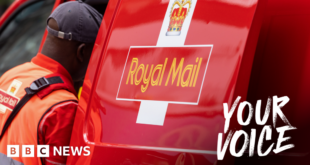From October 7 the Royal Mail raised the price of a first class stamp from £1.35 to £1.65 – a 22% increase and, according to the Greeting Card Association (GCA), the fifth hike in less than three years.
Second class stamps remain at 85p, protected by Ofcom, and the Royal Mail has said the new prices remain below European average prices of £1.73 for first class and £1.33 for second class.
However the GCA, which represents over 500 publishers, retailers, agents, suppliers and distributors, said it fears the rise is part of a “plan to kill off” the second class stamp.

This follows Royal Mail proposals to cut down second class post to three days a week, subject to an Ofcom consultation.
A statement released on October 7 by the GCA read: “The GCA believes that move will seriously undermine consumer trust in the service, leaving the small businesses they represent fearing the service will be wound down – and if it is, it will leave them and the consumers they serve, with no option but to use an unregulated, high price first class stamp for important cards and letters that need to be delivered on time.”
Iain Hamilton, who launched award-winning greeting card business Bewilderbeest in Elmswell six years ago with his wife Maddie, said cuts to services could be ‘devastating’ for businesses.

“They did a magnificent job during the Covid pandemic when they kept our business going. Since then our company has grown, and we now employ four people.
READ MORE: Suffolk business leaders call for ‘reliable Royal Mail’ amid reform proposals
“Having a full time, six day Royal Mail service is essential for businesses. For new firms starting out, utilising Royal Mail services is the only option open to them.
“If they use Royal Mail they can develop what they offer and they can grow, they will then create employment opportunities for more people – it is a virtuous circle which has so many benefits for all concerned.
“I hope they keep it going and don’t make the cuts that some people are talking about. It would be devastating to so many in the greeting card industry, along with so many other local independent businesses across the UK,” he added.
A Royal Mail spokesperson said the Universal Service – the obligation to deliver mail six days a week to every household in the UK for the same price – is currently unsustainable, costing between £1m and £2m a day.

Letter volumes have fallen from 20 billion in 2004/5 to around 6.7 billion a year in 2023/4 with the average household receiving just four letters per week, compared to 14 in 2004/5.
The proposed changes include all non-first class letters being delivered every other weekday and the delivery speed of standard bulk business mail being aligned to second class, arriving within three weekdays rather than two.
There would be no change to the one-price-goes-anywhere service to all parts of the United Kingdom and first class letters would be delivered Monday to Saturday.
Parcels would be delivered up to seven days a week as they are currently.

Nick Landon, chief commercial officer at Royal Mail, said of the stamp price increases: “We always consider price increases very carefully. However, when letter volumes have declined by two-thirds since their peak, the cost of delivering each letter inevitably increase.
“A complex and extensive network is needed to get every letter and parcel across the country for a single price – travelling on trucks, planes, ferries and in some cases drones before it reaches its final destination on foot. We are proud to deliver the Universal Service, but the financial cost is significant.
“The Universal Service must adapt to reflect changing customer preferences and increasing costs so that we can protect the one-price-goes anywhere service, now and in the future.”
Proposed changes to deliveries are subject to an Ofcom consultation next year.



